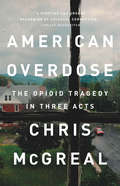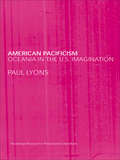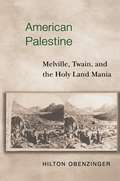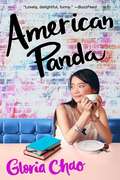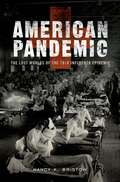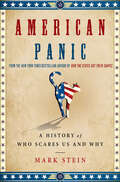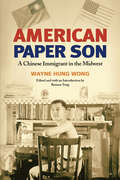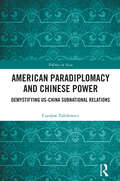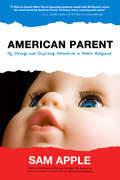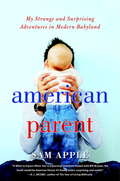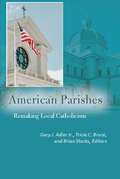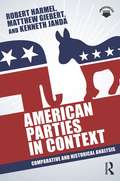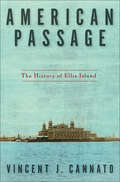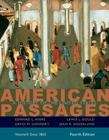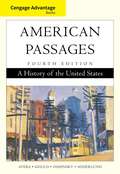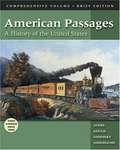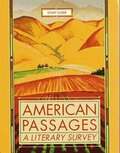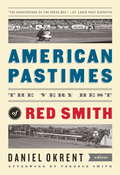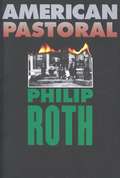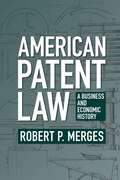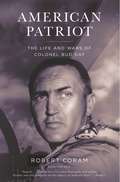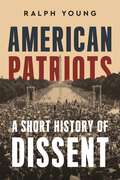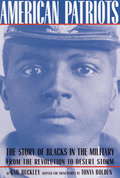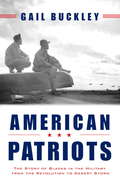- Table View
- List View
American Overdose: The Opioid Tragedy in Three Acts
by Chris McGrealA comprehensive portrait of a uniquely American epidemic--devastating in its findings and damning in its conclusionsThe opioid epidemic has been described as "one of the greatest mistakes of modern medicine." But calling it a mistake is a generous rewriting of the history of greed, corruption, and indifference that pushed the US into consuming more than 80 percent of the world's opioid painkillers.Journeying through lives and communities wrecked by the epidemic, Chris McGreal reveals not only how Big Pharma hooked Americans on powerfully addictive drugs, but the corrupting of medicine and public institutions that let the opioid makers get away with it.The starting point for McGreal's deeply reported investigation is the miners promised that opioid painkillers would restore their wrecked bodies, but who became targets of "drug dealers in white coats."A few heroic physicians warned of impending disaster. But American Overdose exposes the powerful forces they were up against, including the pharmaceutical industry's coopting of the Food and Drug Administration and Congress in the drive to push painkillers--resulting in the resurgence of heroin cartels in the American heartland. McGreal tells the story, in terms both broad and intimate, of people hit by a catastrophe they never saw coming. Years in the making, its ruinous consequences will stretch years into the future.
American Pacificism: Oceania in the U.S. Imagination (Routledge Research in Postcolonial Literatures)
by Paul LyonsThis provocative analysis and critique of American representations of Oceania and Oceanians from the nineteenth century to the present, argues that imperial fantasies have glossed over a complex, violent history. It introduces the concept of ‘American Pacificism’, a theoretical framework that draws on contemporary theories of friendship, hospitality and tourism to refigure established debates around ‘orientalism’ for an Oceanian context. Paul Lyons explores American-Islander relations and traces the ways in which two fundamental conceptions of Oceania have been entwined in the American imagination. On the one hand, the Pacific islands are seen as economic and geopolitical ‘stepping stones’, rather than ends in themselves, whilst on the other they are viewed as ends of the earth or ‘cultural limits’, unencumbered by notions of sin, antitheses to the industrial worlds of economic and political modernity. However, both conceptions obscure not only Islander cultures, but also innovative responses to incursion. The islands instead emerge in relation to American national identity, as places for scientific discovery, soul-saving and civilizing missions, manhood-testing adventure, nuclear testing and eroticized furloughs between maritime work and warfare. Ranging from first contact and the colonial archive through to postcolonialism and global tourism, this thought-provoking volume draws upon a wide, rewarding collection of literary works, historical and cultural scholarship, government documents and tourist literature.
American Palestine: Melville, Twain, and the Holy Land Mania
by Hilton ObenzingerIn the nineteenth century, American tourists, scholars, evangelists, writers, and artists flocked to Palestine as part of a "Holy Land mania." Many saw America as a New Israel, a modern nation chosen to do God's work on Earth, and produced a rich variety of inspirational art and literature about their travels in the original promised land, which was then part of Ottoman-controlled Palestine. In American Palestine, Hilton Obenzinger explores two "infidel texts" in this tradition: Herman Melville's Clarel: A Poem and Pilgrimage to the Holy Land (1876) and Mark Twain's The Innocents Abroad: or, The New Pilgrims' Progress (1869). As he shows, these works undermined in very different ways conventional assumptions about America's divine mission. In the darkly philosophical Clarel, Melville found echoes of Palestine's apparent desolation and ruin in his own spiritual doubts and in America's materialism and corruption. Twain's satiric travelogue, by contrast, mocked the romantic naiveté of Americans abroad, noting the incongruity of a "fantastic mob" of "Yanks" in the Holy Land and contrasting their exalted notions of Palestine with its prosaic reality. Obenzinger demonstrates, however, that Melville and Twain nevertheless shared many colonialist and orientalist assumptions of the day, revealed most clearly in their ideas about Arabs, Jews, and Native Americans. Combining keen literary and historical insights and careful attention to the context of other American writings about Palestine, this book throws new light on the construction of American identity in the nineteenth century.
American Panda
by Gloria Chao&“Weepingly funny.&” —The Wall Street Journal &“Delightful.&” —BuzzFeed &“Charmed my socks off.&” —David Arnold, New York Times bestselling author of Kids of Appetite and Mosquitoland Four starred reviews for this incisive, laugh-out-loud contemporary debut about a Taiwanese American teen whose parents want her to be a doctor and marry a Taiwanese Ivy Leaguer despite her squeamishness with germs and crush on a Japanese classmate.At seventeen, Mei should be in high school, but skipping fourth grade was part of her parents&’ master plan. Now a freshman at MIT, she is on track to fulfill the rest of this predetermined future: become a doctor, marry a preapproved Taiwanese Ivy Leaguer, produce a litter of babies. With everything her parents have sacrificed to make her cushy life a reality, Mei can&’t bring herself to tell them the truth—that she (1) hates germs, (2) falls asleep in biology lectures, and (3) has a crush on her classmate Darren Takahashi, who is decidedly not Taiwanese. But when Mei reconnects with her brother, Xing, who is estranged from the family for dating the wrong woman, Mei starts to wonder if all the secrets are truly worth it. Can she find a way to be herself, whoever that is, before her web of lies unravels? From debut author Gloria Chao comes a hilarious, heartfelt tale of how, unlike the panda, life isn&’t always so black and white.
American Pandemic: The Lost Worlds of the 1918 Influenza Epidemic
by Nancy K. BristowThis readable and compelling account explains the role of race, gender and class, promotion of physical fitness and public education, and America's public health strategy during the influenza epidemics in 1918, 1919, 1920, and 1922. Bristow's work distinguishes itself with her emphasis on influenza epidemics beyond 1918-1919, the roles of physicians and nurses, the importance of public health nursing, and the personal revelation that she lost great-grandparents due to influenza.
American Panic: A History of Who Scares Us and Why
by Mark SteinIn American Panic , New York Times bestselling author Mark Stein traces the history and consequences of American political panics through the years. Virtually every American, on one level or another, falls victim to the hype, intensity, and propaganda that accompanies political panic, regardless of their own personal affiliations. By highlighting the similarities between American political panics from the Salem witch hunt to present-day vehemence over issues such as Latino immigration, gay marriage, and the construction of mosques, Stein closely examines just what it is that causes us as a nation to overreact in the face of widespread and potentially profound change. This book also devotes chapters to African Americans, Native Americans, Catholics, Mormons, Jews, Chinese and Japanese peoples, Communists, Capitalists, women, and a highly turbulent but largely forgotten panic over Freemasons. Striking similarities in these diverse episodes are revealed in primary documents Stein has unearthed, in which statements from the past could easily be mistaken for statements today. As these similarities come to light, Stein reveals why some people become panicked over particular issues when others do not.
American Paper Son: A Chinese Immigrant in the Midwest (Asian American Experience)
by Wayne Hung WongIn the early and mid-twentieth century, Chinese migrants evaded draconian anti-immigrant laws by entering the US under false papers that identified them as the sons of people who had returned to China to marry. Wayne Hung Wong tells the story of his life after emigrating to Wichita, Kansas, as a thirteen-year-old paper son. After working in his father’s restaurant as a teen, Wong served in an all-Chinese Air Force unit stationed in China during World War II. His account traces the impact of race and segregation on his service experience and follows his postwar life from finding a wife in Taishan through his involvement in the government’s amnesty program for Chinese immigrants and career in real estate. Throughout, Wong describes the realities of life as part of a small Chinese American community in a midwestern town. Vivid and rich with poignant insights, American Paper Son explores twentieth-century Asian American history through one person’s experiences.
American Paradiplomacy and Chinese Power: Demystifying US-China Subnational Relations (Politics in Asia)
by Czeslaw TubilewiczThis book investigates contemporary US-China subnational relations and considers the extent to which subnational, national and international power contests inform American states’ strategies of internationalization.Approaching the subject from a constructivist perspective, the book contributes to debates about the relevance of subnational diplomacy to US politics, diplomacy and security. It evaluates the efficacy of Chinese power through influence and interference in co-opting American subnational elites, (re)framing their and the wider public’s social knowledge about China, and (re)shaping the interests, norms and practices guiding relations with China. The book also identifies the limits of Chinese power by exploring how a shift in dominant narratives produces new understandings of opportunities and risks associated with China.Featuring new empirical evidence and a novel theoretical framework, this book will be a valuable resource for students of American politics and foreign relations, paradiplomacy, federal studies, China studies and international relations.
American Parent
by Sam ApplePart memoir, part journalism, part history, part downright strange and hilarious, American Parent takes readers on a unique tour of the world of new mothers and fathers. As Sam Apple embarks on his own journey into parenthood, he decides to put his background in journalism to good use by talking to a wide range of experts. Along the way, Apple visits with the mohel who circumcised him, enters a trance with a childbirth hypnotist, goes on a stakeout with a nanny spy, and attends a lecture on Botox for new mothers. Apple is full of questions, and none is left unexplored: Is the Lamaze method a Stalinist plot? (Yes.) Are newborns really fetuses that are born too soon? (Sort of.) Is there a universal theory that can explain the origins of circumcision in many diverse cultures? (Maybe.) Does it sting when you pour baby shampoo into your own eyes? (Big-time!)And yet for all the unusual twists in this story--at one point Apple fantasizes about a father losing his mind and refusing to remove his BabyBjörn--the strangest twist of all might be that at its core American Parent is a deeply serious and personal book about the way emotionally vulnerable and confused new parents can get lost in the increasingly complex labyrinth of baby products, classes, and fads.
American Parent: My Strange and Surprising Adventures in Modern Babyland
by Sam ApplePart memoir, part journalism, part history, part downright strange and hilarious, American Parent takes readers on a unique tour of the world of new mothers and fathers. As Sam Apple embarks on his own journey into parenthood, he decides to put his background in journalism to good use by talking to a wide range of experts. Along the way, Apple visits with the mohel who circumcised him, enters a trance with a childbirth hypnotist, goes on a stakeout with a nanny spy, and attends a lecture on Botox for new mothers. Apple is full of questions, and none is left unexplored: Is the Lamaze method a Stalinist plot? (Yes.) Are newborns really fetuses that are born too soon? (Sort of.) Is there a universal theory that can explain the origins of circumcision in many diverse cultures? (Maybe.) Does it sting when you pour baby shampoo into your own eyes? (Big–time!) And yet for all the unusual twists in this story—at one point Apple fantasizes about a father losing his mind and refusing to remove his BabyBjörn—the strangest twist of all might be that at its core American Parent is a deeply serious and personal book about the way emotionally vulnerable and confused new parents can get lost in the increasingly complex labyrinth of baby products, classes, and fads.
American Parishes: Remaking Local Catholicism (Catholic Practice in North America)
by Gary J. Adler Jr., Tricia C. Bruce, and Brian StarksParishes are the missing middle in studies of American Catholicism. Between individual Catholics and a global institution, the thousands of local parishes are where Catholicism gets remade. American Parishes showcases what social forces shape parishes, what parishes do, how they do it, and what this says about the future of Catholicism in the United States. Expounding an embedded field approach, this book displays the numerous forces currently reshaping American parishes. It draws from sociology of religion, culture, organizations, and race to illuminate basic parish processes, like leadership and education, and ongoing parish struggles like conflict and multiculturalism. American Parishes brings together contemporary data, methods, and questions to establish a sociological re-engagement with Catholic parishes and a Catholic re-engagement with sociological analysis. Contributions by leading social scientists highlight how community, geography, and authority intersect within parishes. It illuminates and analyzes how growing racial diversity, an aging religious population, and neighborhood change affect the inner workings of parishes. Contributors: Gary J. Adler Jr., Nancy Ammerman, Mary Jo Bane, Tricia C. Bruce, John A. Coleman, S.J., Kathleen Garces-Foley, Mary Gray, Brett Hoover, Courtney Ann Irby, Tia Noelle Pratt, and Brian Starks
American Parties in Context: Comparative and Historical Analysis
by Kenneth Janda Robert Harmel Matthew GiebertRoughly sixty-five years ago, a group of political scientists operating as the "Committee on Political Parties" of the American Political Association thought long and hard about whether the American parties were adequately serving their democracy, and made specific recommendations for improvements. Comparing the parties of this country to those of Great Britain, the Committee found the American parties to be lacking in such fundamentals as clear policy differences, strong and effective organization, and unity of purpose among each party’s representatives in public offices. Starting from that background, this book is intended to significantly enhance students‘ understanding of the American parties today by putting them in broader context. How do the twenty-first century Democrats and Republicans compare to the APSA Committee’s "responsible parties model" of the mid-twentieth? And how do the American parties compare to parties of other democracies around the world, including especially the British parties? Harmel, Giebert, and Janda answer those questions and, in the process, demonstrate that the American parties have moved significantly in the direction of the responsible parties model, but while showing little inclination for implementing the greater discipline the Committee thought essential. Already having provided as much ideological choice as the British parties, the US parties have now edged closer on the other critical requirement of legislative cohesion. The authors show that the latter has resulted "naturally" from the greater homogenization of the meaning of "Democrat" and "Republican" across the country, both within the electorate and now within Congress as well. The dramatic increase in cohesion is not the product of greater party discipline, but rather of sectoral realignments.
American Passage: The Communications Frontier in Early New England
by Katherine GrandjeanKatherine Grandjean shows that the English conquest of New England was not just a matter of consuming territory, of transforming woods into farms. It entailed a struggle to control the flow of information--who could travel where, what news could be sent, over which routes winding through the woods along the early American communications frontier.
American Passage: The History of Ellis Island
by Vincent J. CannatoAmerican Passage explores the remarkable saga of America’s landmark port of entry, from immigration post to deportation center to mythical icon.“A finely honed account that encompasses both the human story of the immigrant experience, often a sad one, and the political and bureaucratic responses.” —Boston GlobeFor most of New York's early history, Ellis Island had been an obscure little island that barely held itself above high tide. Today the small island stands alongside Plymouth Rock in our nation's founding mythology as the place where many of our ancestors first touched American soil.American Passage captures a time and a place unparalleled in American immigration and history, and articulates the dramatic and bittersweet accounts of the immigrants, officials, interpreters, and social reformers who all played an important role in Ellis Island's chronicle. In this sweeping, often heart-wrenching epic, historian Vincent J. Cannato reveals that the history of Ellis Island is ultimately the story of what it means to be an American.“By bringing us the inspiring and sometimes unsettling tales of Ellis Island, Vincent Cannato’s American Passage helps us understand who we are as a nation.” —New York Times bestselling author Walter Isaacson“Cannato resists the temptation to sentimentalize Ellis Island. He understands that, now as then, immigration is an issue that leaves Americans uncomfortable and contentious, even as it continues to bring new blood and energy into the country. Ellis Island may have been converted into something of a feel-good theme park, but the questions it raises remain unresolved.” —Washington Post
American Passages: A History Of The United States
by David M. Oshinsky Lewis L. Gould Edward L. Ayers Jean R. SoderlundNIMAC-sourced textbook
American Passages: A History of the United States
by Lewis Gould David Oshinsky Edward Ayers Jean SoderlundWith a unique attention to time as the defining nature of history, CENGAGE ADVANTAGE BOOKS: AMERICAN PASSAGES: A HISTORY OF THE UNITED STATES, 4e, offers students a view of American history as a complete, compelling narrative. AMERICAN PASSAGES emphasizes the intertwined nature of three key characteristics of time--sequence, simultaneity, and contingency. With clarity and purpose, the authors convey how events grow from other events, people's actions, and broad structural changes (sequence), how apparently disconnected events occurred in close chronological proximity to one another and were situated in larger, shared contexts (simultaneity), and how history suddenly pivoted because of events, personalities, and unexpected outcomes (contingency).
American Passages: A History of the United States, Brief Edition
by David M. Oshinsky Lewis L. Gould Edward L. Ayers Jean R. SoderlundAMERICAN PASSAGES, Brief Edition is a survey of U.S. History that uses online resources and a fully integrated, text-specific Web site to heighten students' awareness and understanding of the past. Crafted from the comprehensive text of the same title, this concise text follows the chronological contours of U.S. history. Each of its 32 chapters focuses on a discrete set of years--allowing the authors to weave events, movements, and groups of people into a unified narrative. The narrative helps students see the ways that different themes and issues in American history have interacted, and allows them to make connections between those themes and issues. Integrated references to the book's Web site and to AMERICAN JOURNEYS ONLINE--a cross-referenced, hyperlinked library of primary sources that are organized by topic--allow students to experience history from the vantage of those who lived it.AMERICAN PASSAGES: A HISTORY OF THE UNITED STATES, Brief Edition is available in the following split options: American Passages, Comprehensive, Brief Edition, First Edition (Chapters 1-32), ISBN: 0155049518; American Passages, Volume I: To 1877, Brief Edition, First Edition (Chapters 1-16), ISBN: 0155051172; American Passages, Volume II: Since 1863, Brief Edition, First Edition (Chapters 15-32), ISBN: 0155051237.
American Pastimes: The Very Best of Red Smith (The Library of America)
by Daniel Okrent Red SmithWalter Wellesley "Red" Smith was the most widely read sportswriter of the last century and the first to win the Pulitzer Prize for commentary. From the 1940s to the 1980s, his nationally syndicated columns for the New York Herald Tribune and later for The New York Times traversed the world of sports with literary panache and wry humor. "I've always had the notion," Smith once said, "that people go to spectator sports to have fun and then they grab the paper to read about it and have fun again." Now, writer and editor (and inventor of Rotisserie League Baseball) Daniel Okrent presents the best of Smith's inimitable columns--miniature masterpieces that remain the gold standard in sportswriting.Here are Smith's indelible profiles of sports luminaries, which show his gift for distilling a career's essence in a single column. Unforgettable accounts of historic occasions--Bobby Thompson's Shot Heard 'Round the World, Don Larsen's perfect game in the 1956 World Series, the first Ali-Frazier fight--are joined by more offbeat stories that display Smith's unmistakable wit, intelligence, and breadth of feeling. Here, too, are more personal glimpses into Smith's life and work, revealed in stories about his lifelong passion for fishing and in "My Press-Box Memoirs," a 1975 reminiscence for Esquire collected here for the first time.A Special Publication of The Library of America.
American Pastoral (American Trilogy #1)
by Philip RothAmerican Pastoral is the story of a fortunate American's rise and fall - of a strong, confident master of social equilibrium overwhelmed by the forces of social disorder. Seymour "Swede" Levov - a legendary high school athlete, a devoted family man, a hard worker, the prosperous inheritor of his father's Newark glove factory - comes of age in thriving, triumphant postwar America. But everything he loves is lost when the country begins to run amok in the turbulent 1960s. Not even the most private, well-intentioned citizen, it seems, gets to sidestep the sweep of history. With vigorous realism, Roth takes us back to the conflicts and violent transitions of the 1960s. This is a book about loving - and hating - America. It's a book about wanting to belong - and refusing to belong - to America. It sets the desire for an American pastoral - a respectable life of space, calm, order, optimism, and achievement - against the indigenous American Berserk.
American Patent Law: A Business and Economic History
by Robert P. MergesStudents and established scholars of intellectual property law often look for historical context when trying to understand the development and present-day contours of IP rules and systems. American Patent Law supplies this context, offering readers a comprehensive account of the evolution of the US patent system and patent doctrine beginning in 1790. From the technologies for harvesting wood and shoemaking in the earliest periods to computer software and biotechnology of the present, each chapter of the book covers the characteristic technologies of each historical era. The book also describes how businesspeople in each era acquired and enforced patents and used patents as the foundation of various business arrangements. This book is a landmark in the history of technologies, the US patent system, and the way private actors have deployed patents across American history.
American Patriot: The Life and Wars of Colonel Bud Day
by Robert CoramDuring the course of his military career, Bud Day won every available combat medal, escaped death on no less than seven occasions, and spent 67 months as a POW in the infamous Hanoi Hilton, along with John McCain. Despite sustained torture, Day would not break. He became a hero to POWs everywhere--a man who fought without pause, not a prisoner of war, but a prisoner at war. Upon his return, passed over for promotion to Brigadier General, Day retired. But years later, with his children grown and a lifetime of service to his country behind him, he would engage in another battle, this one against an opponent he never had expected: his own country. On his side would be the hundreds of thousands of veterans who had fought for America only to be betrayed. And what would happen next would make Bud Day an even greater legend.
American Patriots: A Short History of Dissent
by Ralph YoungA concise history that proves that dissent is patrioticThe history of America is a history of dissent. Protests against the British Parliament’s taxation policies led to the American Revolution and the creation of the United States. At the Constitutional Convention the founders put the right to protest in the First Amendment of the Bill of Rights. In the nineteenth century, dissenters protested against the War of 1812 and the Mexican War, they demanded the abolition of slavery, suffrage for women, and fair treatment for workers. In the twentieth century, millions of Americans participated in the Civil Rights Movement, the antiwar movement, and second-wave feminism. In the twenty-first century, hundreds of thousands protested the war in Iraq, joined the 2011 Occupy movement, the 2017 Women’s March, and the 2020 Black Lives Matter uprisings. The crowds grew larger than ever, but the sentiments expressed were familiar. There have been dissenting Americans for as long as there has been an America.In American Patriots, historian Ralph Young chronicles the key role dissent has played in shaping the United States. He explains that activists are not protesting against America, but pushing the country to live up to its ideals. As he guides the reader through the history of protest, Young considers how ordinary Americans, from moderates to firebrands, responded to injustice. He highlights the work of organizations like SNCC and ACT UP, and he follows iconic individuals like Ida B. Wells-Barnett and Woody Guthrie, charting the impact of their dissent. Some of these protesters are celebrated heroes of American history, while others are ordinary people, frequently overlooked, whose stories show that change is often accomplished through grassroots activism.Yet not all dissent is equal. In 2021, thousands of rioters stormed the US Capitol, and Americans on both sides of the aisle watched the destruction with horror. American Patriots contrasts this attack with the long history of American protest, and challenges us to explore our definition of dissent. Does it express a legitimate grievance or a smokescreen for undermining democracy? What are the limits of dissent? Where does dissent end and sedition begin?In a time when legitimate dissent is framed as unpatriotic, Young reminds us of the dissenters who have shaped our country’s history. American Patriots is a necessary defense of our right to demand better for ourselves, our communities, and our nation.
American Patriots: A Young People's Edition
by Tonya Bolden Gail Lumet BuckleyThey fought on Lexington Green the first morning of the Revolution and survived the bitter cold winter at Valley Forge. They stormed San Juan Hill with Theodore Roosevelt's Rough Riders and manned an anti-aircraft gun at Pearl Harbor. They are the black Americans who fought, often in foreign lands, for freedoms that they did not enjoy at home.Adapted for young readers, this dramatic story brings to life the heroism of people such as Crispus Attucks, Benjamin O. Davis, Charity Adams, and Colin Powell, and captures the spirit that drove these Americans to better their lives and demand of themselves the highest form of sacrifice.From the Hardcover edition.
American Patriots: The Story of Blacks in the Military, from the Revolution to Desert Storm
by Gail BuckleyA dramatic and moving tribute to the military's unsung heroes, American Patriots tells the story of the black servicemen and women who defended American ideals on the battlefield, even as they faced racism in the ranks and segregation on the home front. Through hundreds of original interviews with veterans of every war since World War I, historic accounts, and photographs, Gail Buckley brings these heroes and their struggles to life. We meet Henry O. Flipper, who withstood silent treatment from his classmates to become the first black graduate of West Point in 1877. And World War II infantry medic Bruce M. Wright, who crawled through a minefield to shield a fallen soldier during an attack. Finally, we meet a young soldier in Vietnam, Colin Powell, who rose through the ranks to become, during the Gulf War, the first black chairman of the Joint Chiefs of Staff. Fourteen years in the making, American Patriots is a landmark chronicle of the brave men and women whose courage and determination changed the course of American history.
